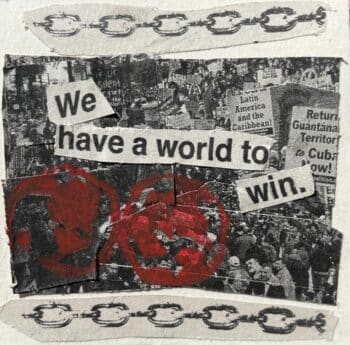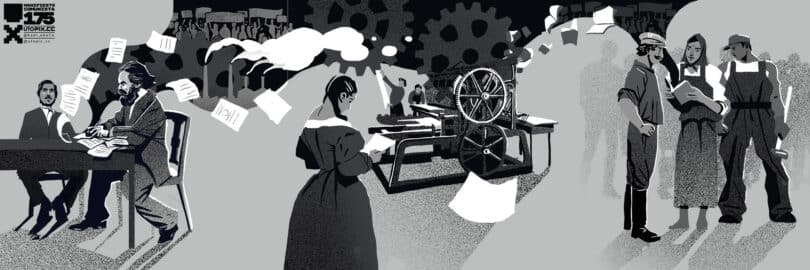Dear friends,
Greetings from the desk of Tricontinental: Institute for Social Research.

Shehi Shafi (Young Socialist Artists/India), Read Marx, 2023.
In December 1998, Fidel Castro addressed the 7th Congress of the Young Communist League in Havana, Cuba, a year after the catastrophic ‘market failure’ in Asia, when global finance exited the region and left behind economic deserts stretching from Korea to Malaysia. ‘The world is rapidly being globalised’, Castro told the Cuban youth, and this globalisation was ‘an unsustainable and intolerable world economic order’ founded on the cannibalisation of nature and the brutalisation of social life. Capitalist ideologues championed greed as foundational for society, but this, Castro cautioned, was merely an ideological claim rather than a statement drawn from reality. Similar ideological claims—such as those about the rational operation of markets—encouraged Castro to insist on the urgent need to wage a ‘battle of ideas’ to make the case for the richness of the human experience against the reductions of market fundamentalism.
‘Not weapons, but ideas will decide this universal battle’, Castro said,
and not because of some intrinsic value, but because of how closely they relate to the objective reality of today’s world. These ideas stem from the conviction that, mathematically speaking, the world has no other way out, that imperialism is unsustainable, that the system that has been imposed on the world leads to disaster, to an insurmountable crisis.

Paolo C. Ratti (Italy), Lapidary Free, 2023.
That was in 1998. Since then, matters have become even more grave. In late January, the Bulletin of the Atomic Scientists brought the Doomsday Clock to 90 seconds to midnight, ‘the closest to global catastrophe it has ever been’. The self-described managers of the ‘world order’ (the G7 countries) who are responsible for this journey to annihilation continue to dominate the Battle of Ideas. This must no longer be permitted.
I am typing these words in Casa de las Américas in Havana, Cuba, which is the home of arts and culture not only for Cuba but all Latin America. Founded in 1959 by Haydée Santamaría (1923—1980), one of the pioneers of the Cuban Revolution, Casa became a reference for the necessity to advance class struggle on the cultural front. For Fidel, institutions such as Casa, with whom we collaborated for our dossier Ten Theses on Marxism and Decolonisation, are integral to this battle of ideas, to this confrontation with a vision of reality that is inimical to human progress. ‘Ideas are not simply an instrument to build consciousness and lead people to fight’, Fidel told the youth in 1998. In fact, ideas ‘have become the main weapon in the struggle, not a source of inspiration, not a guide, not a directive, but the main weapon of the struggle’. He quoted José Martí, the great Cuban patriot, as he often did:
Trenches made of ideas are stronger than those made of stones.
In our dossier, thesis eight focused on the erosion of the collective life. As we wrote then:
Neoliberal globalisation vanquished the sense of collective life and deepened the despair of atomisation through two connected processes:
- by weakening the trade union movement and the social possibilities that come within the public action and workplace struggle rooted in trade unionism.
- by substituting the idea of the citizen with the idea of the consumer—in other words, the idea that human beings are principally consumers of goods and services, and that human subjectivity can be best appreciated through a desire for things.
The breakdown of social collectivity and the rise of consumerism harden despair, which morphs into various kinds of retreat. Two examples of this are: a) a retreat into family networks that cannot sustain the pressures placed upon them by the withdrawal of social services, the increasing burden of care work on the family, and ever longer commute times and workdays; b) a move towards forms of social toxicity through avenues such as religion or xenophobia. Though these avenues provide opportunities to organise collective life, they are organised not for human advancement, but for the narrowing of social possibility.

Yoni Lingga (Indonesia), I Read Banned Books, 2023.
Red Books Day, one gesture to rescue collective life, emerged from the International Union of Left Publishers (IULP), a network of over forty publishing houses. On 21 February 1848, 175 years ago, Marx and Engels published The Communist Manifesto. The IULP picked that day, 21 February, to encourage people from around the world to go into public places, from the street to cafés and union halls, and read their favourite red books (including the manifesto) in their own languages.
In 2020, the first Red Books Day, more than 30,000 people from South Korea to Venezuela joined the public reading of the manifesto in their own languages. The epicentre of Red Books Day was in the four Indian states of Andhra Pradesh, Kerala, Tamil Nadu, and Telangana, where the bulk of public readings took place. Peasant organisations affiliated with the Communist Party of Nepal held readings in rural areas, while the Landless Workers’ Movement (MST) in Brazil held readings in occupied settlements. In Havana, study circles met to read the manifesto, while in South Africa the Sesotho translation was launched and read for the first time. Left publishing houses from Expressão Popular in Brazil to Batalla de Ideas in Argentina and Inkani Books in South Africa also joined the effort. Many participants reported that this was the first time that they had opened a book by Marx and that the captivating prose has drawn them to start study circles of Marxist literature.
Due to the pandemic, Red Books Day 2021 was held largely online, but enthusiasm remained high nonetheless. The publishing house Založba (Slovenia) released a released a short film entitled Dan rdečih knjig (‘Red Books Day’), in which Založba’s writers read from the manifesto. Meanwhile, the publishing house Yordam Kitap in Turkey asked its authors to read from the manifesto in Turkish and organised a talk with Ertuğrul Kürkçü, a leader of the People’s Democratic Party (HDP). Small, appropriately distanced gatherings took place in Kerala, where the manifesto was read in Malayalam and English, as well as in Brazil, where militants of the Landless Workers’ Movement (MST) organised readings of the manifesto in Portuguese in their encampments. Not one corner of India was without Red Books Day events, as readings took place from Assam to Karnataka to Tamil Nadu.
The highlight of Red Books Day 2022 was that half a million people in Kerala (India) read the books of EMS Namboodiripad in 35,000 meetings across the state. Various colleges in Perinthalmanna (Malappuram) held a three-day-long book festival, The Battle of Literature in the Era of the Ban, while the Purogamana Kala Sahitya Sangham (Association of Progressive Art and Literature) held programmes across Kerala. At the Vijayawada Book Festival in Andhra Pradesh, Prajasakti Bookhouse erected a popular Communist Manifesto book stall, while in villages in Maharashtra, night classes were held that reminded participants of the early days of the peasant movement.

Zach Hussein (Palestine/United States), We Have a World to Win, 2022.
Readings were held in Indonesia and Turkey, Brazil and Venezuela. Films were screened and music was sung while social media buzzed with the hashtags of Red Books Day in multiple languages. The South African shack dwellers’ movement Abahlali baseMjondolo held a talent show on Red Books Day at the eKhenana occupation site. ‘The price for land and autonomy is always paid in blood. But struggle is not only shared suffering. It is also shared joy’, the organisation declared.
At dawn on Red Books Day in 2022, members of the neo-fascist RSS organisation entered the Thalassery (Kerala) home of Punnol Haridas, a member of the Communist Party of India (Marxist) or CPI(M). They hacked Haridas, a fisherman, to death. ‘I was supposed to write on my favourite red book today’, wrote V. Sivadasan, a member of parliament and CPI(M) leader,
but I ended up writing about my comrade who was hacked to death by RSS terrorists.
In 2023, the fourth Red Books Day promises to build on previous years, fighting to rescue our collective life from the atomisation of precarious living.
Last week, a severe earthquake struck Turkey and Syria, taking the lives of more than 30,000 people so far, displacing millions in the region and plunging them into precarity. In Syria, U.S.-led sanctions have delayed the delivery of critical international aid. Many also see the high death toll as a result of the Turkish state’s neglect. Following the devastation of the 1999 Gölcük-Marmara earthquake, an ‘earthquake tax’ was levied on the public, raising nearly $4 billion between July 1999 and July 2022. Yet, no clear evidence exists regarding how those funds have been spent and if they have gone towards emergency services and safety measures. In an attempt to rescue collective life in this terrifying moment, Ertuğrul Kürkçü of the HDP calls to ‘transform earthquake solidarity into a social movement’ against the prevailing neoliberal system. If you would like to donate to the relief efforts, you can do so here.
On one side of our world today are red books and the urge to expand the boundaries of humanity and left culture; on the other side are violence and bloodshed, the ghastly side of barbarism. Red Books Day affirms the culture of the future, the culture of humans. It is a crucial front in the Battle of Ideas.
Warmly,
Vijay

